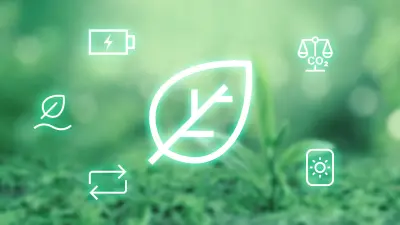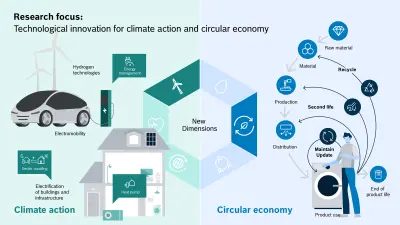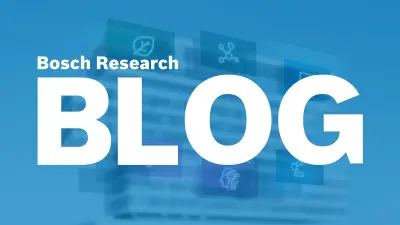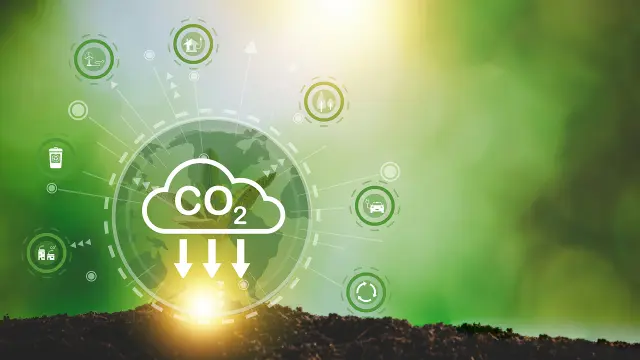Research for greater sustainability
The research work at Bosch Research aims to minimize CO₂ emissions and make more effective use of resources.

Climate change is one of the most pressing problems of our time. The pressure on politicians, society and industry to take action is growing all the time. At the same time, this pressure opens up opportunities for innovations to help meet the challenges and shape the future. As part of Bosch’s global sustainability strategy, Bosch Research experts are working on technological innovations with a focus on climate action and the circular economy.
One of our most important goals is to reduce greenhouse gas emissions. At Bosch Research, our goal in terms of climate protection is to drive the development of technologies that continuously reduce the carbon footprint of our products. This includes our research into the electric drive of the future as well as the electrification of buildings, for example through heat pumps. Hydrogen technologies play an important role in both the electrification of mobility and infrastructure, and the generation of green electricity. Our focus lies on researching and developing electrolyzers and mobile fuel cells.
The second pillar comprises research projects to strengthen the circular economy. To this end, we develop concepts and investigate how products can be designed to be as sustainable as possible throughout their entire life cycle — from development through production and use to a potential “second life”. This also includes researching the resource-saving use of recyclable materials for many Bosch products. With the help of virtual development methods and artificial intelligence (AI) algorithms, we are already calculating how sustainable our products will be over their entire life cycle.

CO₂ reduction technologies
Less is more: Bosch Research is reducing the company’s carbon footprint
Several levers help reduce the CO₂ emissions of our products and contribute to sustainable development. These include optimizing electric drives, developing hydrogen technologies and the electrification of buildings. We see further potential for CO₂ reduction in coupling the electricity, heat and mobility sectors.
Research into electromobility
In electromobility, our research activities aim to make the overall system with electric motor, power electronics and transmission, as efficient as possible: for example, through targeted optimization of components or the use of alternative, recyclable and lighter materials — or less material overall. We have all types of vehicles in mind: from e-bikes to motorbikes, cars, trucks and off-road vehicles such as excavators. And we conduct research at all stages of the electromobility value chain. This includes semiconductor components and power electronics components as well as electric drives and complete systems such as the Bosch eAxis.
The fuel of the future: Research into hydrogen technologies
At Bosch, we believe that chemical energy sources play a central role in climate protection. In the form of hydrogen, for example, climate-neutral electrical energy can be easily stored and transported. Bosch Research is therefore conducting intensive research into hydrogen technologies. Our focus is on the production of hydrogen by means of electrolysis. For example, we are developing the mobile fuel cell (Proton Exchange Membrane Fuel Cell, PEMFC) to power vehicles.
Oil was yesterday: Electrification of buildings
Buildings play an important role in climate protection as well. Around 30 percent of Germany's greenhouse gas emissions can be attributed to their operation, especially heating. Our researchers are working intensively on innovations for electricity-based heating and energy supply using heat pumps¹.
Creating synergies: Sector coupling
Our research covers a range of different areas and creates synergies. Intelligent energy management for buildings therefore means more than just the challenge of CO₂-free heating. The electrification of mobility and buildings will allow previously separate systems to be coupled together. Electric cars could be used as energy storage facilities if their batteries supply the heat pump of a building during the night. The stored electricity would ideally come from a local photovoltaic system and would be used to charge the vehicle’s battery during the day.
When savings alone are not enough: CO₂ removal
Unfortunately, avoiding or reducing CO₂ emissions will not be enough to achieve the 1.5-degree target agreed in the Paris Agreement. Global warming can only be effectively limited if additional CO₂ that is already present can be actively removed from the atmosphere. Bosch Research is evaluating various technologies and market-entry scenarios, as well as possible partners for CO₂ capture.
Extending life cycles through the circular economy
In addition to researching specific innovations for climate protection, we at Bosch Research develop concepts to support product development in terms of the circular economy. This includes assessing our products, including their manufacture, use phase and disposal or recycling, as part of a life cycle assessment (LCA) and life cycle costing (LCC), and influencing them accordingly: one result of this analysis can be, for example, that certain production steps or resources, materials or design elements are particularly critical, making it worthwhile to undertake optimizations. Suitable instruments in this regard include Eco Engineering, which involves checking the sustainability of all development steps of a product, or Eco Design, which primarily focuses on the concrete sustainable nature of the product.
- Eco Engineering: In this area, we develop methods that make the ecological and economic impacts of our product portfolio more transparent with the help of life cycle assessments.
- Eco Design: During the product design phase, we also research technologies and concepts which increase the reusability of components or products. At the same time, we are looking at opportunities to increase the proportion of sustainable materials in our existing product portfolio.
Bosch Research Blog

Interested in the latest research topics? In the Bosch Research Blog, our researchers share hands-on information about their work at the detailed level and on a regular basis.
¹ source: Umwelt Bundesamt

